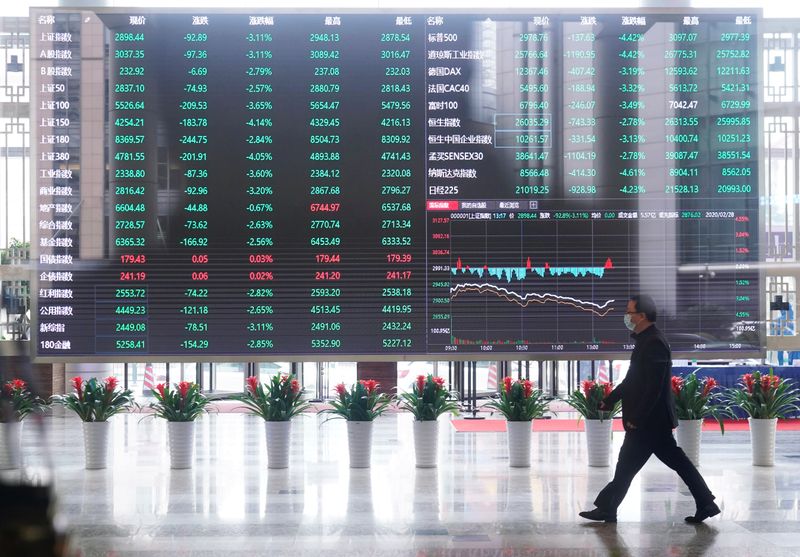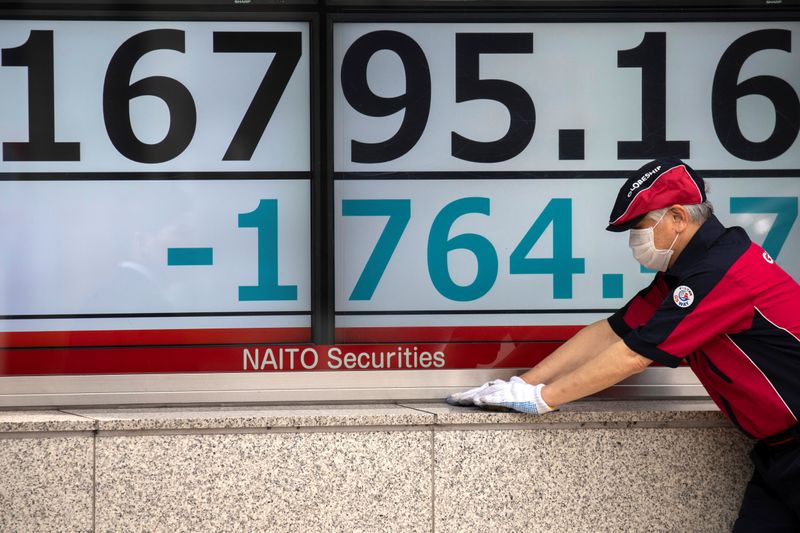By Herbert Lash and Tom Arnold
NEW YORK/LONDON (Reuters) - Shares worldwide skidded further on Friday as a pick-up in U.S. and European business activity did little to ease investors' jitters surrounding Sino-U.S. tensions, while gold kept marching toward a record high as it broke above $1,9000 an ounce.
The mood darkened after Beijing ordered Washington to close the U.S. consulate in Chengdu, in retaliation for China being told to shut its consulate in Houston earlier this week.
European equities fell, even as data showed business activity in the euro zone returned to growth. German manufacturing avoided contraction for the first time in 19 months in July with a notable upturn in sales abroad.
U.S. business activity rose to a six-month high in July, but companies reported a drop in new orders as a resurgence in new COVID-19 cases across the country weighed on demand.
Technology stocks (SX8P) such as SAP SE (DE:SAPG) and ASML Holding NV (AS:ASML) led losses in Europe, while the China-sensitive basic materials sector (SXPP) lost 2.3%.
A 17% slide in Intel Corp (O:INTC) shares after the company said it was six months behind schedule in developing next-generation, power-efficient chip technology pushed U.S. stocks lower, but U.S.-China concerns remained front and center.
"An escalation in U.S.-China tensions that could have hugely negative consequences on stock market leadership, particularly around the U.S. tech giants, is worrying," said Stephen Innes, chief global market strategist at AxiCorp.
"What ultimately matters for growth assets is whether a geopolitical escalation morphs into economic beatdowns."
MSCI's benchmark for global equity markets (MIWD00000PUS) slid 0.73% while emerging markets stocks (MSCIEF) fell 1.69%.
On Wall Street, the Dow Jones Industrial Average (DJI) fell 0.26%, the S&P 500 (SPX) lost 0.46% and the Nasdaq Composite (IXIC) dropped 0.9%.
Overnight in Asia, Chinese blue chips (CSI300) retreated 4.4% to wipe out a week of gains and lead declines.
The Chinese yuan, a barometer of Sino-U.S. relations, was set for its worst week since mid May. It was down 0.2% at 7.0235 per dollar in the offshore market
Gold resumed its march toward $1,900 as the souring U.S.-China relations added fuel to a rally driven by fears over the economic hit from the coronavirus pandemic.
The dispute put copper - a prime Chinese import - on track for its first weekly loss since mid-May, but analysts expect recovering demand and low stocks to keep prices high.
Spot gold prices
Analysts at RBC Capital Markets noted gold-backed exchange traded product holdings had already reached record peaks.
"The level of COVID-19 uncertainty, low and negative real and nominal rates, politics and geopolitics have driven gold prices sharply higher, and pushed allocations among investors ever higher," they said in a note. Silver, meanwhile, was en route to its best week since 1987, up almost 18% in five days.
Oil prices edged higher, supported by a weaker dollar. But U.S.-China tensions and wider economic uncertainty weighed.
Brent crude futures (LCOc1) rose $0.02 to $43.33 a barrel. U.S. crude futures (CLc1) gained $0.07, to $41.14 a barrel.
The euro (EUR=) advanced 0.33% to $1.1632, strengthened by European Union's approval on Monday of a 750 billion-euro (683 billion pounds) recovery fund to revive the region's economies.
The yen

